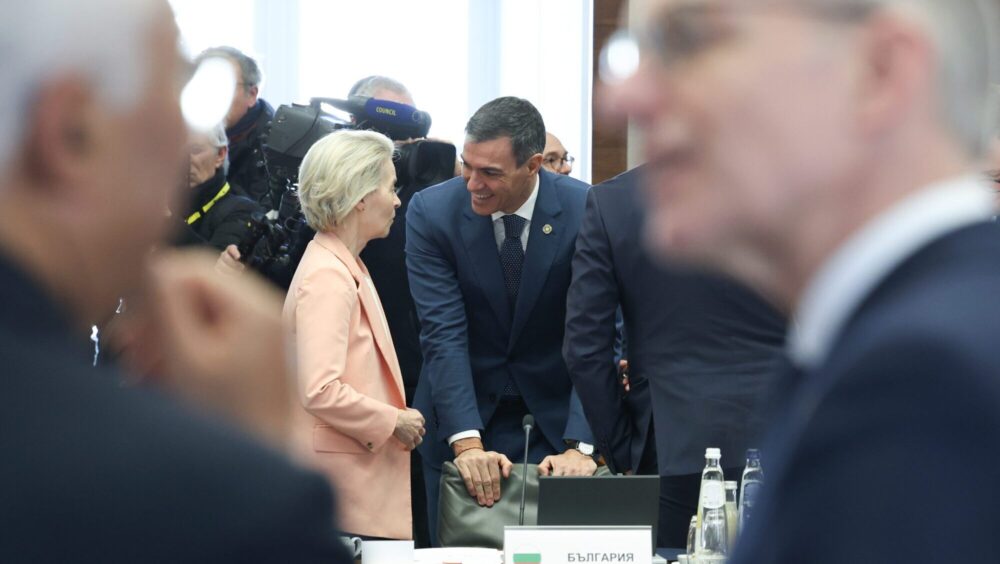
Spanish PM Pedro Sánchez talking to EU Commission President Ursula von der Leyen
European Council, 2025
Spain’s socialist Prime Minister Pedro Sánchez (PSOE) called for raising “a more ambitious and bolder European budget” of “at least” 2% of the bloc’s annual GDP on Monday, to have more leverage on trade and defense.
The proposal, which would mean doubling the current budget to over €2 trillion, is supposed to help the EU to combat President Trump’s tariffs and global defense challenges. It would allow Brussels to allocate the €100 billion cash pot on joint defense procurement that has been in the talks for over a year, as well as other major expenditures like the recently announced €200 billion AI investment.
Sánchez is set to officially present his plan to his European colleagues in Brussels soon. But while the idea of having more financial leverage over global developments sounds good on paper to many member states, the means to reach it is a different question.
The strategic document drawn up by the Spanish government calls for the creation of a new “joint debt mechanism,” similar to the joint pandemic-relief loans but much bigger, as well as to refinance the current debts of the Next Generation EU instrument for at least another ten years.
This would effectively turn the EU into a ‘debt union,’ with Brussels gaining another layer of permanent financial leverage over member states.
Northern countries such as Germany, the Netherlands, and the Scandinavians have always been wary of the idea of taking on joint loans together with smaller and less productive economies, and they only agreed to it in December 2020 after Brussels promised them that it was a one-time measure.
Nonetheless, the idea of taking on more, or even permanent common debt has been floated by the Commission countless times in the past few years, often presented as a necessity to raise the funds required to boost the bloc’s defense capabilities but also as a means to pay back the existing debts.
Conservatives in Brussels have been frequently criticizing these proposals, including Sánchez’s latest call for the long-term institutionalization of joint EU debts.
Danish MEP Anders Vistisen, the whip of the Patriots for Europe (PfE) group, told europeanconservative.com that Sánchez’ “spend like a drunken sailor mentality” would never fly with “fiscally responsible” countries like the Nordics or Netherlands.
“It would be absolute madness to allow the EU to have a common debt mechanism given its propensity for profligate spending of other people’s money,” Vistisen said. The MEP argued that the instrument would take away countries’ individual fiscal responsibilities and encourage them to overspend using other countries’ resources. Vistisen even paraphrased Margaret Thatcher when said:
The problem with socialism [and a common debt mechanism] is that you eventually run out of other peoples’ money.
Furthermore, putting the EU in a permanent debt spiral also represents a grave danger to member state sovereignty, Vistisen warned. He added that conservative politicians cannot allow their voters to become “hard-pressed debt slaves” of the EU and owe it to them to protect national sovereignty from “greedy EU federalist fanatics who would happily run up huge debt and wasteful spending on someone else’s tab.”
Other conservative parties, including the Spanish VOX (PfE) and the Sweden Democrats (ECR), also rejected the idea on social media. MEP Jorge Buxadé (VOX/PfE) said such a joint debt mechanism is effectively a tax on “our children and grandchildren” and said his party would vote never to accept it.
